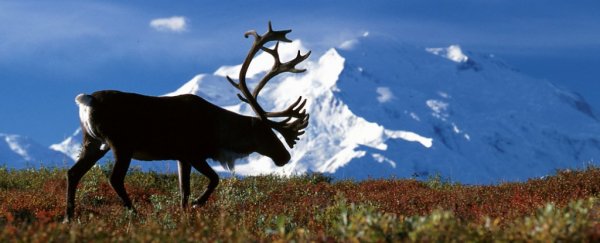Indigenous groups and environmental advocates are calling on the oil and gas industry to stand against drilling in the Arctic National Wildlife Refuge (ANWR) - the largest wildlife refuge in the nation.
The environmental resistance includes representatives from the Gwich'in Nation, national environmental activists, and institutional investors representing more than $2.5 trillion.
Two letters were sent to major companies within the oil and gas industry. The first letter was written by the the Gwich'in Steering Committee and signed by over 100 environmental organizations, including 35.org, Greanpeace USA, Patagonia and the Alaska Wildlife Alliance.
"We ask oil and gas companies, and the banks that fund them, to stand with the Gwich'in Nation by not initiating any oil and gas development in the Arctic Refuge," wrote the Gwich'in Steering Committee, opposing "any efforts to develop oil and gas" on their sacred land.
The coastal plains of section 1002 of ANWR are important calving grounds for the 200,000-strong Porcupine caribou herd, the source of 80 percent of the Gwich'in diet.
As such, the Gwich'in people have been fighting to save what they call "the sacred place where life begins" for years. However, when President Trump signed the GOP tax bill last year, the decade-old ban on drilling in the ANWR was lifted.
"As the world rapidly shifts towards clean energy sources, we are also gravely concerned about the climate, financial and reputational risks associated with pursuing a speculative fossil fuel source that will likely become uneconomical," the committee letter continues.
"It is both deeply unethical and unwise to permanently destroy lands vital to the culture and existence of the Gwich'in to pursue this high-risk gamble."
In a second letter, over 100 investors - representing some $2.52 trillion - stood with the Gwich'in Nation against drilling in "one of the wildest places left on the planet."
The letter not only cites "financial" and "reputational" risks, it also argues for "ecological" and "human rights" considerations.
"In summary, we strongly urge banks and oil and gas companies to honor their fiduciary duty to investors and refuse to engage in drilling in the Arctic Refuge," the letter concludes.
"We, as investors, encourage expanding support for the wide range of clean energy solutions and sustainable industries in Alaska, instead of helping to destroy this natural wonder."
Signatories of the letter include the David Rockefeller Fund, several religious foundations, and BNP Paribas Asset Management.
The fight over the future of ANWR has been a political battle for several years. Alaska Senator and Republican Lisa Murkowski has made it her mission as the current chairwoman of the Senate Energy and Natural Resources Committee to open 1.5 million acres of the Arctic refuge up to drilling.
At the end of 2017, she finally got her way, and the Interior Department was officially tasked with identifying the best lands to lease.
"Once the department comes up with a list of options, there will be at least one comment period in which the public will have a chance to be heard," The New York Times reported.
"We're going to take our case to the American public now," said Senator Maria Cantwell, a Democrat who opposed the new legislation.
Cantwell stands a good chance of finding support from the public. Over 70 percent of Americans agree that the Arctic Refuge is no place to drill, according to the Yale Program on Climate Change Communication (YPCCC).
Instead of reasoning with lawmakers and arguing widespread public support, environmental advocates and the Gwich'in people appealed directly to major industries.
"Any oil company or bank that supports drilling in the Arctic National Wildlife Refuge faces enormous reputational risk and public backlash," wrote the Gwich'in Steering Committee.
"Their brands would be associated with trampling on human rights, destroying one of the world's last remaining intact wild places, and contributing to the climate crisis."
Still, this might not be enough to convince the oil and gas industry that drilling is a bad idea.
Kara Moriarty, president and chief executive of the Alaska Oil and Gas Association, told The New York Times that "industry support for having access to the coastal plain has never wavered."
If the industry hasn't wavered before, it seems unlikely that they will waver now.
Science AF is ScienceAlert's new editorial section where we explore society's most complex problems using science, sanity and humor.
